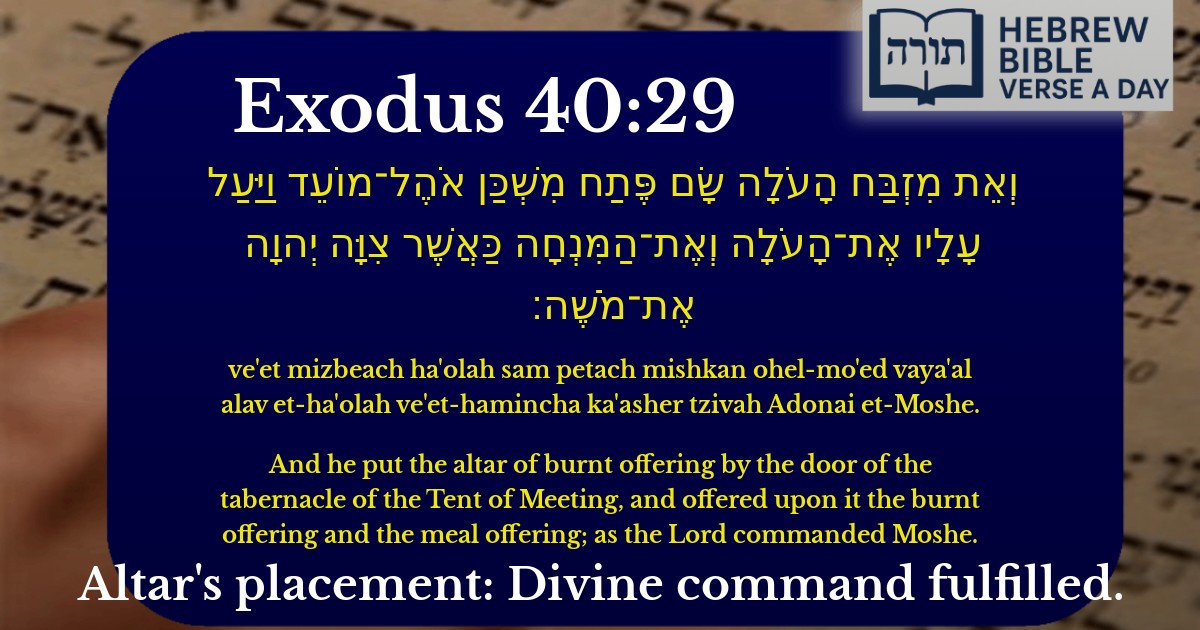Join Our Newsletter To Be Informed When New Videos Are Posted
Join the thousands of fellow Studends who rely on our videos to learn how to read the bible in Hebrew for free!
Hebrew Text
וְאֵת מִזְבַּח הָעֹלָה שָׂם פֶּתַח מִשְׁכַּן אֹהֶל־מוֹעֵד וַיַּעַל עָלָיו אֶת־הָעֹלָה וְאֶת־הַמִּנְחָה כַּאֲשֶׁר צִוָּה יְהוָה אֶת־מֹשֶׁה׃
English Translation
And he put the altar of burnt offering by the door of the tabernacle of the Tent of Meeting, and offered upon it the burnt offering and the meal offering; as the Lord commanded Moshe.
Transliteration
Ve'et mizbeach ha'olah sam petach mishkan ohel-mo'ed vaya'al alav et-ha'olah ve'et-hamincha ka'asher tzivah Adonai et-Moshe.
Hebrew Leining Text
וְאֵת֙ מִזְבַּ֣ח הָעֹלָ֔ה שָׂ֕ם פֶּ֖תַח מִשְׁכַּ֣ן אֹֽהֶל־מוֹעֵ֑ד וַיַּ֣עַל עָלָ֗יו אֶת־הָעֹלָה֙ וְאֶת־הַמִּנְחָ֔ה כַּאֲשֶׁ֛ר צִוָּ֥ה יְהֹוָ֖ה אֶת־מֹשֶֽׁה׃ <span class="mam-spi-samekh">{ס}</span>
וְאֵת֙ מִזְבַּ֣ח הָעֹלָ֔ה שָׂ֕ם פֶּ֖תַח מִשְׁכַּ֣ן אֹֽהֶל־מוֹעֵ֑ד וַיַּ֣עַל עָלָ֗יו אֶת־הָעֹלָה֙ וְאֶת־הַמִּנְחָ֔ה כַּאֲשֶׁ֛ר צִוָּ֥ה יְהֹוָ֖ה אֶת־מֹשֶֽׁה׃ {ס}
🎵 Listen to leining
Parasha Commentary
📚 Talmud Citations
This verse is not quoted in the Talmud.


Placement of the Altar
The verse states that the altar of burnt offering was placed at the entrance of the Mishkan (Tabernacle). Rashi (Exodus 40:6) explains that this positioning was deliberate—placing the altar outside the Mishkan proper, yet near its entrance, symbolized that sacrifices serve as a preparatory step before entering the sacred space. The altar's location teaches that one must first atone and draw close to Hashem through korbanot (offerings) before approaching deeper levels of holiness.
The Offerings: Olah and Mincha
The verse mentions two offerings: the olah (burnt offering) and the mincha (meal offering). The Rambam (Hilchot Maaseh HaKorbanot 1:3) explains that the olah is entirely consumed on the altar, representing complete devotion to Hashem. The mincha, made of fine flour, signifies humility and gratitude, as it is a modest offering compared to animal sacrifices. Together, they reflect different aspects of divine service—total commitment and humble acknowledgment of Hashem's benevolence.
Fulfillment of Divine Command
The phrase "as the Lord commanded Moshe" underscores the precision required in avodat Hashem (divine service). The Midrash Tanchuma (Pekudei 11) emphasizes that every detail of the Mishkan's construction and service was executed exactly as instructed, demonstrating Moshe's unwavering obedience and the importance of adhering to halachah (Jewish law) without deviation. This principle applies to all mitzvot, teaching that fulfillment must align precisely with divine will.
Symbolism of the Altar's Position